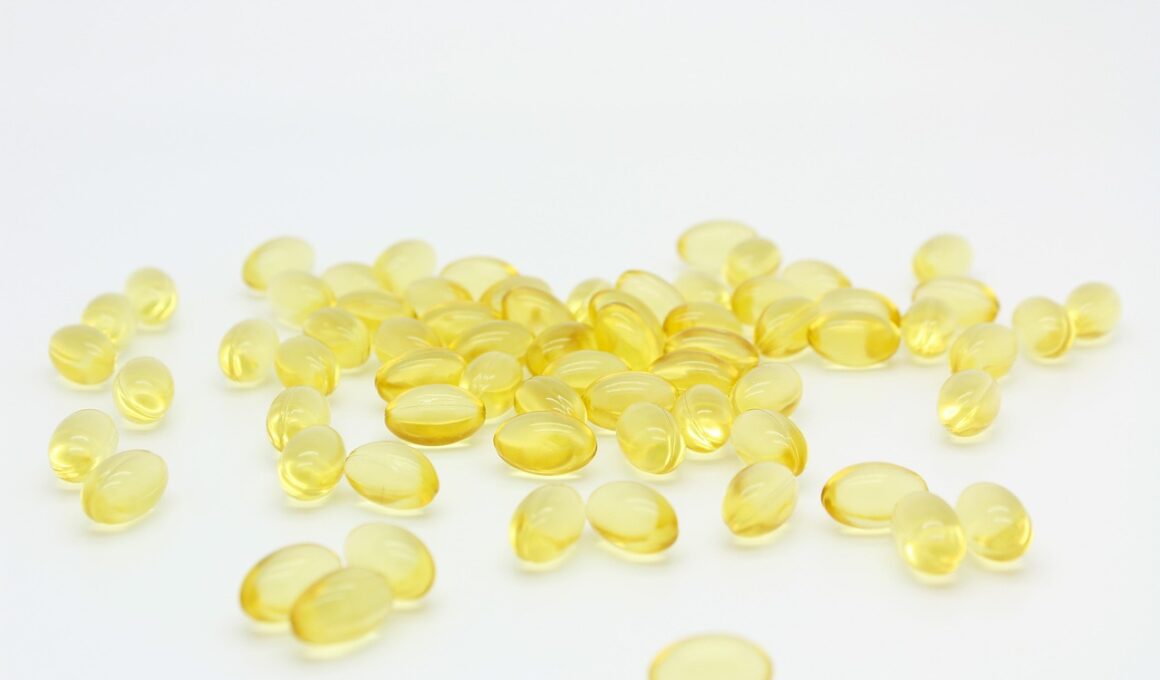Fish Oil and Puppy Development: Essential Nutrients
Fish oil and omega-3 fatty acids play a crucial role in puppy development. These essential nutrients help in brain health, cognitive development, and the overall growth of puppies. Many dog owners may not know that omega-3s can be derived from various sources, including fish oil. Ensuring a balanced diet rich in omega-3 supports not just physical growth, but also behavioral development. This understanding encourages responsible pet ownership, emphasizing the importance of nutrition during a puppy’s early life stages. Health professionals frequently recommend fish oils as an important supplement in canine diets. The omega-3s found in fish oil are particularly beneficial compared to omega-6s, which are typically in abundance in standard dog food. These fatty acids often help in reducing inflammation, boosting the immune system, and promoting healthier skin and fur. Intentional incorporation of omega-3 rich diets can help prevent long-term health issues in dogs, making this nutrient vital for pet owners to consider. Beyond just physical benefits, proper nutrition through omega-3 and fish oil can lead to happier, more lively puppies, ultimately enhancing their quality of life for years to come.
Puppies, like human infants, undergo rapid development during their first few months of life. During this phase, their nutritional needs are heightened, particularly their need for omega-3 fatty acids. Critical for cellular health, omega-3s support the development of the nervous system and retina. As such, many breeders are now advocating for diets enriched with these essential nutrients from an early age. The impact of fish oil on cognitive function is backed by numerous studies suggesting that puppies benefit significantly from omega-3 supplementation. Enhanced learning abilities, along with improved problem-solving skills, are often observed in dogs receiving omega-3s. Moreover, a well-nourished puppy tends to exhibit more positive behavior traits. There’s an interesting correlation between omega-3 intake and reduced aggression in dogs, leading to calmer and more sociable pets. The incorporation of fish oil into a puppy’s diet can improve their overall mood and reduce stress levels, making it a vital addition to their nutrition plan. Ultimately, it’s the combination of a balanced diet and omega-3s that significantly shapes a puppy’s formative experiences during their crucial early life stages.
The Role of Omega-3 in Immune Function
The immune system of puppies is still developing, making them more susceptible to illnesses. Regular intake of omega-3 fatty acids can enhance immune function significantly. These essential nutrients have anti-inflammatory properties, which are pivotal in maintaining optimal immune responses. Fish oil is highly regarded for its ability to help combat different infections, making it an invaluable supplement. Furthermore, studies indicate that dogs receiving omega-3 supplementation tend to have fewer allergic reactions compared to those without it. In addition to boosting immunity, omega-3s may also promote skin health, combating dryness and irritation. This can lead to a shinier and healthier coat, which in turn can further reduce the likelihood of skin infections. Puppies with healthier skin and fur are often less prone to scratching and other behavioral issues stemming from discomfort. Therefore, when considering a suitable diet for puppies, focusing on sources rich in omega-3 can yield significant health benefits. In summary, integrating fish oil into a puppy’s diet not only fortifies their immune system but also nourishes their skin, leading to a healthier lifestyle overall.
Moreover, the cardiovascular benefits of omega-3 cannot be overlooked. Just like humans, dogs can experience heart-related issues, especially as they age. Feeding puppies diets enriched with fish oil may help establish better cardiovascular health from a young age. Omega-3s have been linked to lower blood pressure, reduced triglycerides, and improved heart rhythms. These advantages contribute to the overall health and longevity of dogs. An additional benefit is the potential improvement in joint health. As puppies grow, they may face conditions such as hip dysplasia or arthritis later in life. By incorporating omega-3 into their diets, the development of joint issues may be delayed or mitigated. This is particularly beneficial for active breeds or those engaged in rigorous activities. The lubricating properties of omega-3 fatty acids can lead to enhanced mobility and greater flexibility over time. Maintaining optimal joint health from an early age ensures that puppies can remain active and playful well into their adult life. In conclusion, fish oil and omega-3 fatty acids are not just supplements; they are essential components of a holistic approach to canine nutrition.
Beauty and Health: Coat Quality
Nutrition significantly influences the coat quality of puppies, and omega-3 fatty acids play a fundamental role. Dog owners often desire puppies with shiny, vibrant coats, which are a reflection of good health. Fish oil is known to enhance coat sheen and overall appearance, and the nutritional components in fish oil help nourish skin cells. Puppies that receive adequate omega-3 tend to have fewer skin problems, such as dryness or flakiness, leading to overall better skin health. This is critical as skin health often serves as the first indicator of nutritional deficiencies. Dogs suffering from skin-related issues can also exhibit behavioral problems like excessive scratching or biting. Therefore, ensuring they receive sufficient omega-3 can contribute to both external and internal well-being. Regular supplementation can lead to luster in fur, reducing shedding and allergens in the home. Furthermore, the maintenance of a healthy coat can also improve bonding between dogs and their owners. When puppies look good, they feel good, contributing to their overall sense of happiness and well-being. It’s evident that optimal nutrition directly influences the visual appeal of our canine companions.
Finally, the introduction of fish oil should be done gradually within a puppy’s diet. Too much of a new food source can lead to digestive upset, hence a slow transition is essential. It’s advisable for owners to start with small amounts and gradually increase to recommended dosages. Consulting with a veterinarian ensures appropriateness regarding quantities tailored to individual puppy sizes and health needs. Notably, fresh, high-quality fish oil products are advisable over those that may contain additives or artificial ingredients. Careful storage is also essential to maintain the efficacy of fish oils, as they can degrade. Benefits of selecting reputable brands are significant; quality fish oil retains its health benefits effectively. Additionally, the method in which fish oil is integrated into a puppy’s diet can vary, such as through wet food, dry food, or direct supplementation. The goal is to create a pleasurable feeding experience that ensures puppies eagerly consume their meals. Ultimately, quality nutrition is a linchpin for the healthy development of every puppy, anchoring their journey towards becoming healthy adult dogs.
Conclusion: Emphasizing Balanced Diets
In conclusion, the importance of fish oil and omega-3 fatty acids in puppy development cannot be overstated. These nutrients provide numerous advantages, supporting healthy growth, enhancing cognitive function, and contributing to physical well-being. Dog owners should be proactive in identifying reputable sources of fish oil and understanding the correct dosages for their pets. Integrating these essential nutrients will lead to happier, healthier puppies who thrive under responsible care. A balanced, nutrient-rich diet is vital during this formative stage, significantly impacting their lifespan and overall quality of life. Pet owners must prioritize nutrition, taking into consideration the individual needs of their puppies. Observational studies consistently highlight the advantages of omega-3 supplementation, reinforcing the vital role of diet in dog health. By focusing on a holistic approach to nutrition that includes fish oil, pet owners can equip their dogs for a healthy, vibrant life. Encourage healthy habits early on to ensure they grow into well-rounded, energetic adult dogs. Hence, establishing a nutritious feeding regimen from the beginning sets the foundation for lifelong health, ensuring each puppy has the opportunity to reach its full potential.
Puppies require careful nutritional consideration for their overall development. Providing fish oil as a supplementation gives them the best start to healthy growth. Pet care is both a commitment and responsibility, emphasizing the need for understanding the benefits of nutritional choices. Enriching a puppy’s diet through omega-3s yields significant psychological and physical benefits, contributing to their overall quality of life. Dietary choices made during the puppy stage can have lasting impacts as individual dogs mature. The correlation between adequate nutrition and optimal health has been recognized across veterinary science. To support happy, vibrant lives, pet owners must make informed choices regarding their pets’ dietary needs. Feeding for health is not just an option but a necessity. The essential nutrients gained from fish oil will help puppies avoid developmental issues as they grow. Therefore, prioritizing the inclusion of fish oil in diets can significantly boost a puppy’s health trajectory. Moreover, the decision to ensure quality nutrition can lead to rewarding experiences between dogs and their owners. In summary, omega-3 supplementation through fish oils represents a proactive approach to fostering the health and happiness of puppies.


